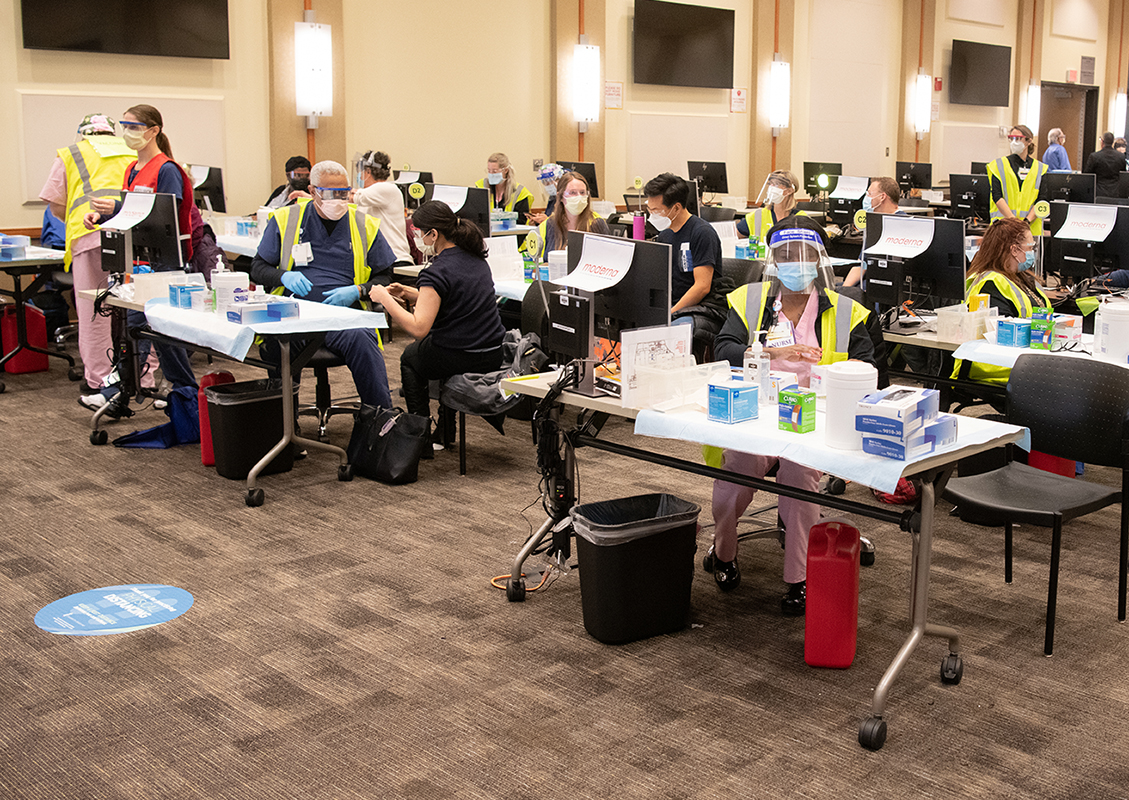
|
 |
The vaccination clinic, located at the University of Maryland Baltimore’s SMC Campus Center. Photo courtesy Matthew P. D’Agostino, M.A., Photographer, Office of Communications and Public Affairs, University of Maryland, Baltimore. |
|
As it presses one of its Baltimore COVID-19 vaccination clinics into service, the University of Maryland Medical System (UMMS) has been calling on Clark School Professor Jeffrey Herrmann (ME/ISR) for his public health clinic predictive modeling expertise.
The clinic, located at the University of Maryland Baltimore’s (UMB) SMC Campus Center, was set up in January to vaccinate UMMS staff, UM School of Medicine faculty and employees, and UMB staff, and expanded its scope to offer vaccinations for individuals meeting Phase 1B and 1C criteria according to the State of Maryland’s vaccination plan. Herrmann has been working as a subject matter expert to help the UMMS and UMB staff plan the clinic layout and operations.
The operations research specialist is building on what he learned developing mass dispensing and vaccination clinic models a decade ago with the U.S. Centers for Disease Control and Prevention (CDC); the National Association of County and City Health Officials (NACCHO), and public health officials from the Montgomery County, Md., government.
He has already helped UMMS determine the best layout and capacity for the SMC Campus Center clinic. But there’s plenty more to be done.
As news headlines will attest, large teams of people are needed to figure out all the issues involved in “getting shots into arms.” Herrmann is using his skills to build predictive mathematical models for decision making and put them in user-friendly Excel spreadsheet tools that will aid teams in their planning.
He ticks off just a few of the things the UMMS team is dealing with:
“There’s the uncertainty of the vaccine supply, the hesitancy of the public to get vaccinated, the need to have enough personnel to staff the clinics. There’s pharmacy concerns, including being able to keep the Pfizer vaccine ultra-cold. For both the Pfizer and Moderna vaccines, there’s the dosing, because two doses are required. There are a host of logistics issues. There are supply issues: for all the vaccines, for the needles, for the masks, for the gloves. There’s the planning part—how many people are actually showing up for their appointments? There’s the need to interface with the state, which is providing the vaccines. Then there’s a whole information technology infrastructure needed for scheduling—including scheduling those second doses—and to support all of these other things.”
Herrmann says those on the front lines are so busy dealing with everything the situation is throwing at them that they don’t have the bandwidth to do things like modeling to help them make the best decisions. “Because I’m not on the line as they are, and because I have expertise in building models to predict the future based on data and reasonable assumptions, I can help. My job is to support them.”
The dynamic nature of the pandemic and the efforts to combat it makes the challenge even tougher. “Things are very much in flux,” Herrmann says. “Speaking as an engineer, we are not at a place where we can optimize operations. There are more fundamental things to worry about. But these planners are learning rapidly, and one of the ways I can assist is to help people make decisions in dynamic situations, and then optimize the system when that’s appropriate.”
UMMS includes University of Maryland Medical Center (UMMC) in Baltimore, the system’s flagship academic hospital, as well as 12 other hospitals across the state. While the detailed plans Herrmann is developing were originally for the SMC Campus Center site, UMMS also is using them to advise other hospitals in the system.
“The system level issues are complicated, Herrmann says. “The hospitals are working together in the UMMS network, but each one needs to do things a little differently based on its own situation. One of the things my modeling can help with is to show how the operations at the different hospitals can be coordinated to achieve what the system as a whole needs to do.”
“UMMS has done a great job, even given all the uncertainties,” Herrmann says. “There are so many challenges in standing up an unprecedented operation like this in such a short period of time. It is satisfying to know I can help people today because of the things I learned in my research.”
— We would like to thank our colleagues at the University of Maryland Medical System and the University of Maryland, Baltimore for their generous assistance with this story.
| Learn more about Dr. Herrmann's public health planning model work |
Related Articles:
UMD developing COVID-19 decision making tools for colleges
NSF grant will further planning for collaborative autonomy testing infrastructure
Gabriel spending academic year in two visiting professorships
With MIPS funding, Herrmann and Azarm developing algorithm for ice forecasting app
Gabriel, Brubaker developing game theory water market models for river users
A Tech Rx for COVID Recovery at Home
New model can help decisionmakers planning to retrofit buildings for energy efficiency
Public health planners: Free resources for emergency health clinics
Steven Gabriel participates in two international academic events
Ph.D. student Kevin Lister wins Link Foundation Fellowship
January 28, 2021
|

